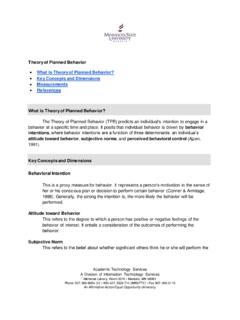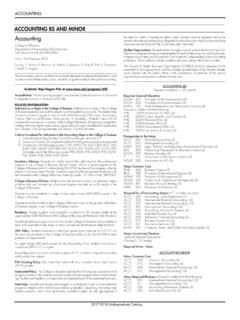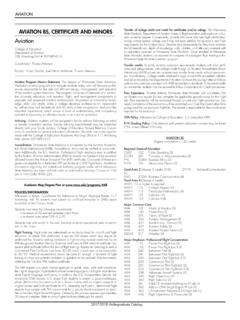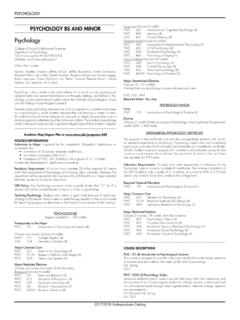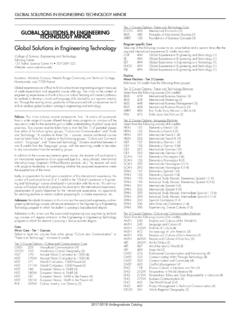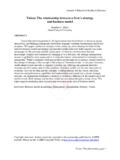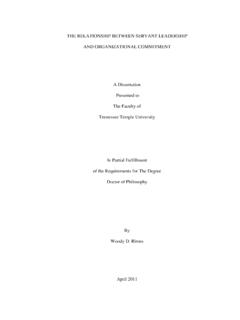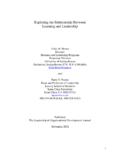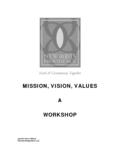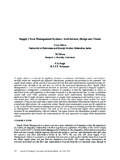Transcription of Review Paper: Leadership styles
1 Advances In Management Vol. 7(2) February (2014) 57 Review paper : Leadership styles Nan jundeswaras wamy T. S.* and Swamy D. R. Department of Indust rial Engineering and Management , JSS Aca demy of T echnical Educat ion, Bangalore, INDIA * Abstract In this global competitive environment, effective Leadership style is necessary to reduce the attrition rate. From the effective Leadership styles only it is possible to achieve organizational goal productively. Leadership styles affect on the employee performance and productivity.
2 This paper summarizes and analyzes the available literature of Leadership styles and effect on different components of Quality of work life. Keywords: Leadership styles , productivity, performance, work life. Introduction An effective leader inf luences followers in a desired manner to achieve desired goals. Different Leadership styles may affect organizat ional effectiveness or performance30. Transformational Leadership is a stronger predictor of both job satisfaction and overall sat isfaction7.
3 In the study it was concluded that organizat ional performance is influenced by a competitive and innovat ive culture. Organizat ional Culture is influenced by Leadership style and consequently, Leadership style affects organizational performance. Review of Literature Leadership styles : Leadership is a social inf luence process in which the leader seeks the voluntary participat ion of subordinat es in an effort to reach organizat ion goals10. A leader can be defined as a person who delegates or influencing others to act so as to carry out specified objectives28.
4 Today s organizations need effective leaders who understand the complexit ies of the rapidly changing global environment. If the task is highly structured and the leader has good relationship with the employees, effectiveness will be high on the part of the employees. The study further revealed that democratic leaders take great care to involve all members of the team in discussion and can work with a small but highly motivated team. Barchiesi et al1 measured the Leadership effectiveness and Leadership role and its inf luence on performance, Leadership behaviors, attitudes.
5 They found that high Leadership indexes are not related to past performance records but associated both to higher potentiality of enhanced performance and to higher reputation of organizations, point ing in the direction of a meaningful inf luence of behavioral complexity and dynamics on the Leadership perceived level. A mechanism of Leadership styles affecting team innovat ion in the private research centers investigated the relat ionship between different Leadership styles and team innovat ion with the mediating effects of knowledge sharing and team communication14.
6 Explor ing the Relat ionship between Organizat ional Culture and Style of Leadership we used the factors like Organizat ional Culture, Charismat ic Leadership , Transformational Leadership and Transactional Leadership . Voon et al37 found out the influence of Leadership styles on employees job satisfaction in public sector organizations in Malays ia. They used the factors like salar ies, job autonomy, job security, workplace flexibility. Out of these factors, they found that transformational Leadership style has a stronger relationship with job satisfaction.
7 Chung Hs iung Fang et al13 ident ified that Leadership style can affect organizational commitment and work satisfaction positively and work satisfaction intern can affect organizat ional commitment and work performance positively. Leadership is largely culturally orient ated, embracing traditional beliefs, norms and values and a preoccupation29. According to Goh Yuan et al17 study, Leadership style is significantly influenced by the leader s immediate and extended fam ily, clan and tribe.
8 This study finds the linkages between organizational Leadership and business ethics, thereby making a contribution toward increasing the quality of organizat ional life which may have a posit ive influence on both members of the organizat ion and the wider community. Lu Ye et al27 study explained employees perceptions about transactional or transformational Leadership style of executive, both have highly posit ive correlat ion with perceptions about executive s encouragement factors of its innovation climate.
9 Podsakoff et al32 said that Leadership behavior can affect trust and satisfaction of employees to organization and organizat ional cit izenship behavior further enhances the relat ionship between Leadership style and organizat ional commitment directly. Transactional Leadership is considered as the subordinates rewards through their efforts and performance. Guang-yi et al18 compared the Transactional Leadership . Transformational Leadership theory is deemed to improve the subordinates performance by changing the motives and values of employees.
10 Bass5 divided Leadership style into transformational Leadership and transactional Leadership . Transformational Leadership has the characteristics of individual inf luence, spiritual encouragement and intellectual st imulation. They often take individual into consideration, establish vision and aim ins ide, create open culture, trust the staff to reach their goals and give full play for staff's potential. Advances In Management Vol. 7(1) January (2014) 58 Transactional Leadership is focused on staff s basic and external demand, the relat ionship between leaders and subordinates is based on the contract.
